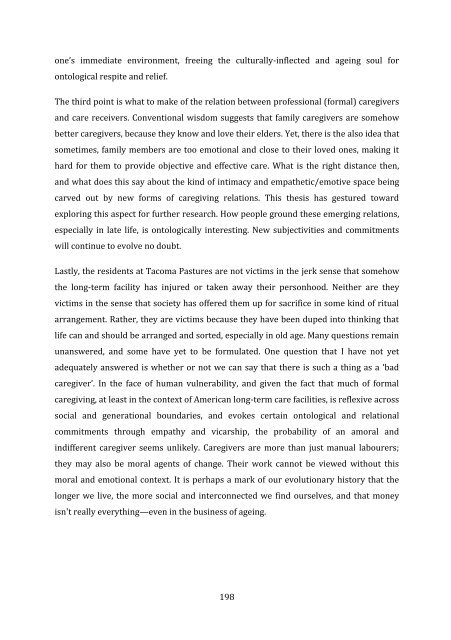Philip Y. Kao PhD thesis - Research@StAndrews:FullText
Philip Y. Kao PhD thesis - Research@StAndrews:FullText
Philip Y. Kao PhD thesis - Research@StAndrews:FullText
Create successful ePaper yourself
Turn your PDF publications into a flip-book with our unique Google optimized e-Paper software.
one’s immediate environment, freeing the culturally-inflected and ageing soul for<br />
ontological respite and relief.<br />
The third point is what to make of the relation between professional (formal) caregivers<br />
and care receivers. Conventional wisdom suggests that family caregivers are somehow<br />
better caregivers, because they know and love their elders. Yet, there is the also idea that<br />
sometimes, family members are too emotional and close to their loved ones, making it<br />
hard for them to provide objective and effective care. What is the right distance then,<br />
and what does this say about the kind of intimacy and empathetic/emotive space being<br />
carved out by new forms of caregiving relations. This <strong>thesis</strong> has gestured toward<br />
exploring this aspect for further research. How people ground these emerging relations,<br />
especially in late life, is ontologically interesting. New subjectivities and commitments<br />
will continue to evolve no doubt.<br />
Lastly, the residents at Tacoma Pastures are not victims in the jerk sense that somehow<br />
the long-term facility has injured or taken away their personhood. Neither are they<br />
victims in the sense that society has offered them up for sacrifice in some kind of ritual<br />
arrangement. Rather, they are victims because they have been duped into thinking that<br />
life can and should be arranged and sorted, especially in old age. Many questions remain<br />
unanswered, and some have yet to be formulated. One question that I have not yet<br />
adequately answered is whether or not we can say that there is such a thing as a ‘bad<br />
caregiver’. In the face of human vulnerability, and given the fact that much of formal<br />
caregiving, at least in the context of American long-term care facilities, is reflexive across<br />
social and generational boundaries, and evokes certain ontological and relational<br />
commitments through empathy and vicarship, the probability of an amoral and<br />
indifferent caregiver seems unlikely. Caregivers are more than just manual labourers;<br />
they may also be moral agents of change. Their work cannot be viewed without this<br />
moral and emotional context. It is perhaps a mark of our evolutionary history that the<br />
longer we live, the more social and interconnected we find ourselves, and that money<br />
isn't really everything—even in the business of ageing.<br />
198
















